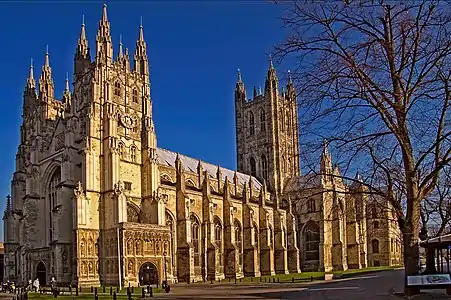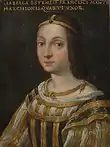1539
Year 1539 (MDXXXIX) was a common year starting on Wednesday (link will display the full calendar) of the Julian calendar.
| Millennium: | 2nd millennium |
|---|---|
| Centuries: | |
| Decades: | |
| Years: |
| 1539 by topic |
|---|
| Arts and science |
| Leaders |
|
| Birth and death categories |
| Births – Deaths |
| Establishments and disestablishments categories |
| Establishments – Disestablishments |
| Works category |
|
| Gregorian calendar | 1539 MDXXXIX |
| Ab urbe condita | 2292 |
| Armenian calendar | 988 ԹՎ ՋՁԸ |
| Assyrian calendar | 6289 |
| Balinese saka calendar | 1460–1461 |
| Bengali calendar | 946 |
| Berber calendar | 2489 |
| English Regnal year | 30 Hen. 8 – 31 Hen. 8 |
| Buddhist calendar | 2083 |
| Burmese calendar | 901 |
| Byzantine calendar | 7047–7048 |
| Chinese calendar | 戊戌年 (Earth Dog) 4235 or 4175 — to — 己亥年 (Earth Pig) 4236 or 4176 |
| Coptic calendar | 1255–1256 |
| Discordian calendar | 2705 |
| Ethiopian calendar | 1531–1532 |
| Hebrew calendar | 5299–5300 |
| Hindu calendars | |
| - Vikram Samvat | 1595–1596 |
| - Shaka Samvat | 1460–1461 |
| - Kali Yuga | 4639–4640 |
| Holocene calendar | 11539 |
| Igbo calendar | 539–540 |
| Iranian calendar | 917–918 |
| Islamic calendar | 945–946 |
| Japanese calendar | Tenbun 8 (天文8年) |
| Javanese calendar | 1457–1458 |
| Julian calendar | 1539 MDXXXIX |
| Korean calendar | 3872 |
| Minguo calendar | 373 before ROC 民前373年 |
| Nanakshahi calendar | 71 |
| Thai solar calendar | 2081–2082 |
| Tibetan calendar | 阳土狗年 (male Earth-Dog) 1665 or 1284 or 512 — to — 阴土猪年 (female Earth-Pig) 1666 or 1285 or 513 |

March: Canterbury Cathedral surrenders.
Events
January–June
- January – Toungoo–Hanthawaddy War – Battle of Naungyo, Burma: The Toungoos decisively defeat the Hanthawaddys.
- January 12 – Treaty of Toledo: Charles V, Holy Roman Emperor (and Charles I of Spain) and Francis I of France agree to make no further alliances with England. The treaty comes after Henry VIII of England's split with Rome and Pope Paul III.
- January 14 – Spain annexes Cuba.
- February 9 – The first horse race is held at Chester Racecourse, the oldest in use in England.[1]
- March – Canterbury Cathedral surrenders, and reverts to its previous status of 'a college of secular canons'.
- May 30 – Hernando de Soto lands at Tampa Bay, Florida with 600 soldiers, with the goal of finding gold. He also introduces pigs into North America.
- May – The Six Articles, an Act of the Parliament of England, reaffirms certain Catholic principles in Henry VIII's Church of England.[2]
- June 26 – Battle of Chausa in modern-day Buxar, India: Sher Shah Suri defeats the Mughal emperor, Humayun (Sher Shah goes on to form the Sur Empire, and take control of nearly all Mughal territory).
July–December
- August 15 – King Francis I of France issues the Ordinance of Villers-Cotterêt, that places the whole of France under the jurisdiction of the royal law courts, and makes French the language of those courts, and the official language of legal discourse.
- September 7 – Guru Angad Dev becomes the second Guru of the Sikhs.
- October 4 – Henry VIII contracts to marry Anne of Cleves.[3]
- November 1 – Joachim II Hector introduces Lutheranism in the Margraviate of Brandenburg, becoming the second Prince-Elector after the Prince-Elector of Saxony to turn Protestant.
- November 26 – Abbot Marmaduke Bradley and 31 monks sign the deed surrendering Fountains Abbey to the English Crown. [4]
Undated
- Protestant Reformation
- Lutheranism is forcibly introduced into Iceland, despite the opposition of Bishop Jón Arason.
- Beaulieu Abbey, Bolton Abbey, Colchester Abbey, Newstead Abbey, St Albans Abbey, St Mary's Abbey, York and Hartland Abbey (the last) fall prey to the Dissolution of the Monasteries in England.
- The first edition of the Calvinist Genevan Psalter is published.
- In Henan province, China, a severe drought with swarms of locusts is made worse, by a major epidemic outbreak of the plague.
- The first printing press in North America is set up in Mexico City.[5]
- Teseo Ambrogio's Introductio in Chaldaicam lingua, Syriaca atq Armenica, & dece alias linguas, published in Pavia, introduces several Middle Eastern languages to western Europe for the first time.
Births
- January 28 – Nicolò Donato, Doge of Venice (d. 1618)
- February 13 – Elisabeth of Hesse, Electress Palatine by marriage (1576-1582) (d. 1582)
- February 23
- Henry XI of Legnica, thrice Duke of Legnica (d. 1588)
- Salima Sultan Begum, Empress of the Mughal Empire as a wife of Emperor Akbar (d. 1613)
- February 27 – Franciscus Raphelengius, Dutch printer (d. 1597)
- March 5 – Christoph Pezel, German theologian (d. 1604)
- March 18 – Maria of Nassau, Countess of Nassau (d. 1599)
- April 5 – George Frederick, Margrave of Brandenburg-Ansbach (d. 1603)
- April 6 – Amalia of Neuenahr, German noble (d. 1602)
- April 7
- Tobias Stimmer, Swiss artist (d. 1584)
- Strange Jørgenssøn, Norwegian businessman (d. 1610)
- April 30 – Archduchess Barbara of Austria, Austrian archduchess (d. 1572)
- May 22 – Edward Seymour, 1st Earl of Hertford (d. 1621)
- May 29 – Thomas Pounde, English Jesuit lay brother (d. 1613)
- June 6 – Catherine Vasa, Regent of East Frisia (1599-1610) (d. 1610)
- June 13 – Jost Amman, Swiss printmaker (d. 1591)
- June 23 – William Darrell of Littlecote, English politician (d. 1589)
- July 4 – Louis VI, Elector Palatine (d. 1583)
- September 18 – Louis Gonzaga, Duke of Nevers, Italian-French dignitary and diplomat (d. 1595)
- October 1 – Peter Vok, Czech noble (d. 1611)
- November 1 – Pierre Pithou, French lawyer and scholar (d. 1596)
- December 5 – Fausto Paolo Sozzini, Italian theologian (d. 1604)
- December 20 – Paulus Melissus, German composer (d. 1602)
- December 31 – John Radcliffe, English politician (d. 1568)
- date unknown
- José Luis Carvajal y de la Cueva, Portuguese explorer (d. 1590)
- Hasegawa Tōhaku, Japanese painter (d. 1610)
- Laurence Tomson, English Calvinist (d. 1608)
- Humphrey Gilbert, English adventurer, explorer, member of Parliament and soldier (d. 1583)
Deaths
- January 24 – Anneke Esaiasdochter, Dutch Anabaptist writer (b. 1509)
- February – Narapati of Prome, king of Prome in Burma.
- February 6 – John III, Duke of Cleves (b. 1491)
- February 13 – Isabella d'Este, Marquise of Mantua (b. 1474)[6]
- March 5 – Nuno da Cunha, Portuguese governor in India (b. 1487)
- March 12 – Thomas Boleyn, 1st Earl of Wiltshire, English diplomat and politician (b.1477)
- March 19 – Lord Edmund Howard, English nobleman (b. c. 1478))
- April 17 – George, Duke of Saxony (b. 1471)
- April 19 – Katarzyna Weiglowa, Jewish martyr (b. 1460)
- April 30 – John Bourchier, 1st Earl of Bath, English noble (b. 1470)
- May 1 – Isabella of Portugal, Holy Roman Empress (b. 1503)[7]
- May 7 – Ottaviano Petrucci, Italian printer (b. 1466)
- May 7 or September 22 – Guru Nanak, founder of Sikhism (b. 1469)
- June 20 – Philip III, Count of Waldeck-Eisenberg (1524–1539) (b. 1486)
- July 5 – St Anthony Maria Zaccaria, Italian saint (b. 1502)
- July 9 – Adrian Fortescue, English Roman Catholic martyr (b. 1476)
- August – Vannoccio Biringuccio, Italian metallurgist (b. 1480)
- September 8 – John Stokesley, English prelate (b. 1475)[8]
- November 14 – Hugh Cook Faringdon, English Abbot of Reading
- December 12 – Bartolomeo degli Organi, Italian musician (b. 1474)
- December 20 – Johannes Lupi, Flemish composer (b. c. 1506)
- date unknown
- James Beaton, Scottish church leader (b. 1473)
- Cura Ocllo, Inca queen
References
- Paul Hurley (May 15, 2016). Chester History Tour. Amberley Publishing Limited. p. 2. ISBN 978-1-4456-5704-2.
- Everett, Jason M., ed. (2006). "1539". The People's Chronology. Thomson Gale.
- Williams, Hywel (2005). Cassell's Chronology of World History. London: Weidenfeld & Nicolson. pp. 210–215. ISBN 0-304-35730-8.
- Coppack, Glyn (2009). Fountains Abbey. Amberley. pp. 11, 130. ISBN 978-1-84868-418-8.
- "The Press in Colonial America" (PDF). A Publisher’s History of American Magazines — Background and Beginnings. Archived from the original (PDF) on June 27, 2016. Retrieved August 22, 2013.
- Frieda, Leonie (2013). The deadly sisterhood : a story of women, power and intrigue in the Italian Renaissance, 1427-1527 (Paperback ed.). London: Phoenix. p. 358. ISBN 978-0-7538-2844-1.
- "Isabella of Portugal". www.ngv.vic.gov.au. Retrieved October 24, 2020.
- "Stokesley, John (1475–1539), bishop of London". Oxford Dictionary of National Biography (online ed.). Oxford University Press. 2004. doi:10.1093/ref:odnb/26563. ISBN 978-0-19-861412-8. Retrieved October 26, 2021. (Subscription or UK public library membership required.)
This article is issued from Wikipedia. The text is licensed under Creative Commons - Attribution - Sharealike. Additional terms may apply for the media files.


